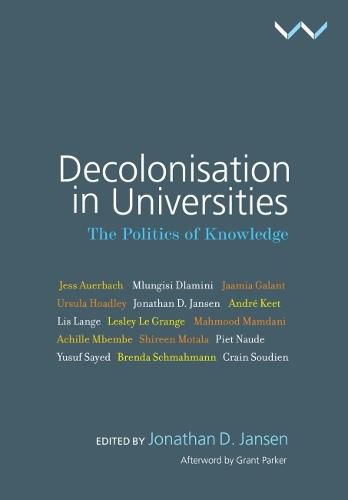Readings Newsletter
Become a Readings Member to make your shopping experience even easier.
Sign in or sign up for free!
You’re not far away from qualifying for FREE standard shipping within Australia
You’ve qualified for FREE standard shipping within Australia
The cart is loading…






This title is printed to order. This book may have been self-published. If so, we cannot guarantee the quality of the content. In the main most books will have gone through the editing process however some may not. We therefore suggest that you be aware of this before ordering this book. If in doubt check either the author or publisher’s details as we are unable to accept any returns unless they are faulty. Please contact us if you have any questions.
Shortly after the giant bronze statue of Cecil John Rhodes came down at the University of Cape Town, student protestors called for the decolonisation of universities. It was a word hardly heard in South Africa’s struggle lexicon and many asked: What exactly is decolonisation? This book brings together some of the most innovative thinking on curriculum theory to address this important question. In the process, several critical questions are raised: Is decolonisation simply a slogan for addressing other pressing concerns on campuses and in society? What is the colonial legacy with respect to curricula and can it be undone? How is the project of curricula decolonisation similar to or different from the quest for post-colonial knowledge, indigenous knowledge or a critical theory of knowledge? What does decolonisation mean in a digital age where relationships between knowledge and power are shifting? Strong conceptual analyses are combined with case studies of attempts to ‘do decolonisation’ in settings as diverse as South Africa, Uganda, Tanzania and Mauritius. This comparative perspective enables reasonable judgments to be made about the prospects for institutional take-up within the curriculum of century-old universities. Decolonisation in Universities is essential reading for undergraduate teaching, postgraduate research and advanced scholarship in the field of curriculum studies.
$9.00 standard shipping within Australia
FREE standard shipping within Australia for orders over $100.00
Express & International shipping calculated at checkout
This title is printed to order. This book may have been self-published. If so, we cannot guarantee the quality of the content. In the main most books will have gone through the editing process however some may not. We therefore suggest that you be aware of this before ordering this book. If in doubt check either the author or publisher’s details as we are unable to accept any returns unless they are faulty. Please contact us if you have any questions.
Shortly after the giant bronze statue of Cecil John Rhodes came down at the University of Cape Town, student protestors called for the decolonisation of universities. It was a word hardly heard in South Africa’s struggle lexicon and many asked: What exactly is decolonisation? This book brings together some of the most innovative thinking on curriculum theory to address this important question. In the process, several critical questions are raised: Is decolonisation simply a slogan for addressing other pressing concerns on campuses and in society? What is the colonial legacy with respect to curricula and can it be undone? How is the project of curricula decolonisation similar to or different from the quest for post-colonial knowledge, indigenous knowledge or a critical theory of knowledge? What does decolonisation mean in a digital age where relationships between knowledge and power are shifting? Strong conceptual analyses are combined with case studies of attempts to ‘do decolonisation’ in settings as diverse as South Africa, Uganda, Tanzania and Mauritius. This comparative perspective enables reasonable judgments to be made about the prospects for institutional take-up within the curriculum of century-old universities. Decolonisation in Universities is essential reading for undergraduate teaching, postgraduate research and advanced scholarship in the field of curriculum studies.